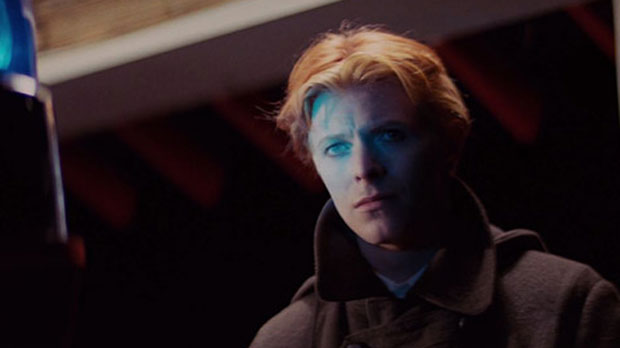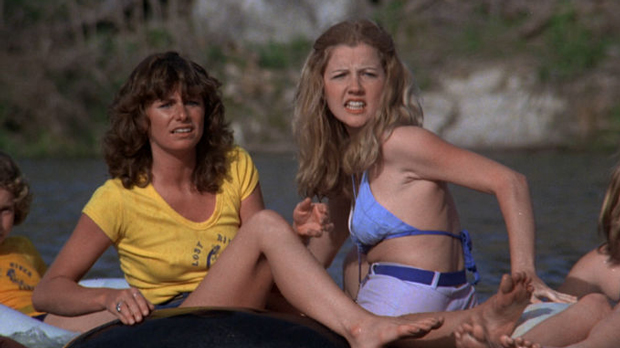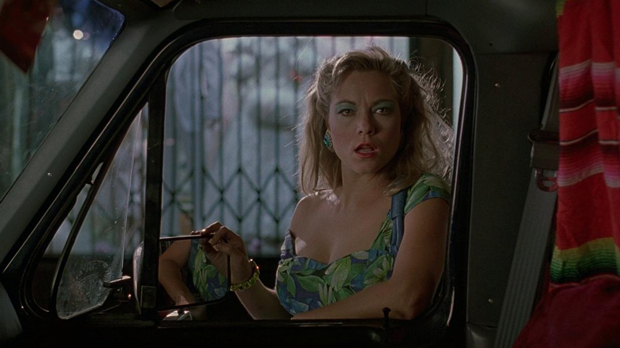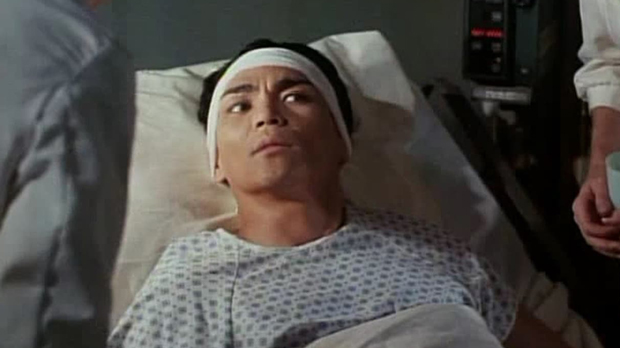 The Man Who Fell to Earth (1976) Cinema 5 Distributing/Sci-Fi-Drama RT: 139 minutes Rated R (strong sexual content, graphic nudity, some language, lots of drinking) Director: Nicolas Roeg Screenplay: Paul Mayersberg Music: John Phillips and Stomu Yamashta Cinematography: Anthony Richmond Release date: May 28, 1976 (US) Cast: David Bowie, Rip Torn, Candy Clark, Buck Henry, Bernie Casey, Jackson D. Kane, Rick Riccardo, Tony Mascia, Linda Hutton, Hilary Holland, Adrienne Larussa, Captain James Lovell, Claudia Jennings (uncredited). Box Office: N/A
The Man Who Fell to Earth (1976) Cinema 5 Distributing/Sci-Fi-Drama RT: 139 minutes Rated R (strong sexual content, graphic nudity, some language, lots of drinking) Director: Nicolas Roeg Screenplay: Paul Mayersberg Music: John Phillips and Stomu Yamashta Cinematography: Anthony Richmond Release date: May 28, 1976 (US) Cast: David Bowie, Rip Torn, Candy Clark, Buck Henry, Bernie Casey, Jackson D. Kane, Rick Riccardo, Tony Mascia, Linda Hutton, Hilary Holland, Adrienne Larussa, Captain James Lovell, Claudia Jennings (uncredited). Box Office: N/A
Rating: *** ½
A sci-fi movie like The Man Who Fell to Earth would not be made by a mainstream studio today. It’s far too cerebral and abstract for the multiplex crowd. It requires too much thought for casual Friday night viewing. A movie this bizarre could only have been made in the 70s when major studios were still willing to take a chance on films that didn’t fit the traditional mold. It’s a different story today. If The Man Who Fell to Earth was made today, it would be by an independent studio. You’d more likely find it playing at an arthouse theater than the local AMC.
I had the privilege of seeing the full, uncut version of The Man Who Fell to Earth on the big screen when it was rereleased in summer ’12. It’s the way director Nicolas Roeg (Don’t Look Now) intended it to be seen. The version briefly released to American theaters in ’76 was cut by 20 minutes in order to make it more commercial. That’s after it was rejected by Paramount head Barry Diller for not being the film the studio wanted. I don’t know what planet this guy’s from, but did he seriously expect something normal from a filmmaker as idiosyncratic as Roeg? Boy, did he get a wrong number!
Iconic rocker David Bowie makes his big screen debut as the title character otherwise known as Thomas Jerome Newton. He’s come to Earth on a most important mission. His home planet is dying from a catastrophic drought. He needs to transport a large quantity of water in order to save his home and family. To that end, he starts a major tech-based corporation specializing in electronics products using the advanced technology of his own world. Aided by prominent patent attorney Oliver Farnsworth (Henry, The Graduate), it quickly becomes a success which allows Newton to pursue his next step, building a spaceship big enough to return home with the water. Naturally, the government does everything they can to screw things up for the undocumented alien in their midst. Their scientists want to perform experiments on the visitor from another world.
Newton becomes romantically involved with Mary-Lou (Clark, American Graffiti), a lonely hotel maid who teaches him Earth customs like sex, watching too much TV and drinking excessively. They take up residence in an isolated area of New Mexico where he becomes a Howard Hughes-like recluse albeit one capable of watching several TVs at once. Newton eventually reveals his true alien self to Mary-Lou, but not before he’s figured out by Thomas Bryce (Torn, Tropic of Cancer), a lecherous former college professor he hires as a fuel technician at his company, World Enterprises.
Roeg gives The Man Who Fell to Earth an otherworldly feel in many ways, especially as the passage of time is concerned. We’re NEVER told how much time passes, but we know it’s a lot by the way the supporting characters get older. Newton looks the same throughout while Mary-Lou and the others show signs of aging. While his appearance never changes, his attitude does. He assimilates to his new surroundings too well. He becomes lazy and complacent, especially after he’s captured and confined by earthly government baddies led by Mr. Peters (Casey, Sharky’s Machine). This is one of the many ways Roeg’s sci-fi film deviates from its genre. It’s more of an alien character study than an effects-driven invasion actioner. The title The Man Who Fell to Earth has two meanings. It refers to Newton’s physical fall to Earth AND his existential fall into oblivion as he loses sight of his objective with the introduction of earthly vices.
The Man Who Fell to Earth is a unique viewing experience, to say the least. It seems to go out of its way NOT to explain itself. For example, how does Newton’s transport vehicle work? It doesn’t look like the usual spaceship of sci-fi movies and it remains behind after he’s gone. Is it a teleportation device? If so, then how do you explain the opening shot of Newton hurtling through the atmosphere on his way to his crash-landing on Earth? You DON’T! That’s precisely the point, I think. It’s less concerned with plot details than ideas, mostly implied. Roeg is very sparing in his use of special effects. We get a few shots of Newton’s family waiting for him on his dry, desolate home planet. They seem to be the only living beings on the planet. More than anything, these few shots evoke sadness in giving us the impression that Newton will never see them again.
Bowie is absolutely perfect in the title role. His otherworldly, androgynous appearance suits him well as does his calm, laconic demeanor. I can’t see anybody but him as Newton. Clark is good as Mary-Lou, a naïve sort who likes booze a little too much. By the end, her sweetness is replaced by resentment and bitterness brought on by years of alcohol abuse. Henry delivers a sad, touching performance as the company head whose affectionate relationship with his significant other (yes, he’s gay) serves as a display of true humanity in an inhumane world. Torn has some good moments as Newton’s confidante.
The surreal cinematography and disjointed narrative make The Man Who Fell to Earth feel like a strange, beautiful dream. Perhaps it is a bit longer than it needs to be. At times, it’s too oblique for its own good, but that’s the nature of a Nicolas Roeg film. He’s willing to experiment with form and style. Previous credits like Performance, Walkabout and Don’t Look Now prove this. It doesn’t always serve him well; look (or rather DON’T) at 1980’s Bad Timing, it’s HORRIBLE! The Man Who Fell to Earth is a good film for those that like to think rather than just watch.




